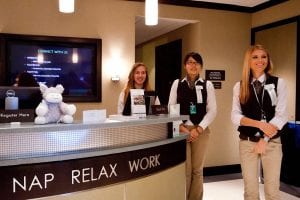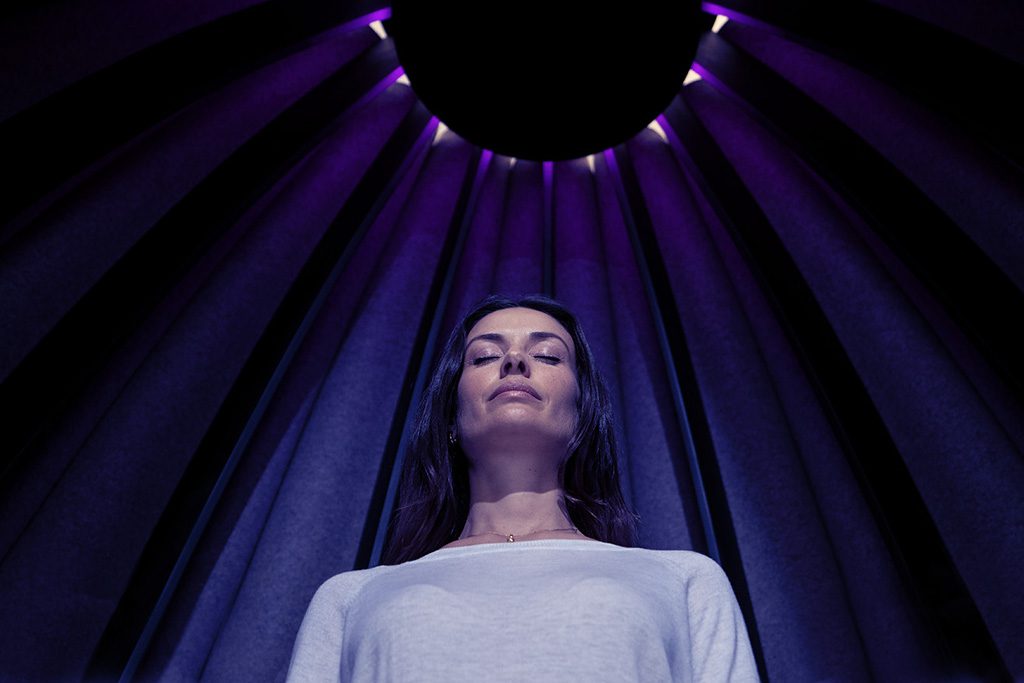Skift Take
Thanks to the wellness movement, both airlines and airports are upping their healthy offerings, and not just for elite travelers. Whether or not the meditation apps and relaxation suites they're increasingly offering is actually making a difference, though, is up for debate.
Airports and airplanes may be one of the most stressful places you can visit — there’s not only the chaos of going through security and finding your gate but also the anxiety of boarding the plane that puts travelers about as far away from a yoga studio high as imaginable. And don’t even get us started on the food — unless you have the privilege of flying first or business class.
As the wellness trend flourishes— after all, it’s now a $4.2 trillion industry — it’s influencing the travel sector more and more. Still, it’s obvious that there’s a lot of room for improvement, both at airports and in-flight. With the bar so low, airlines and airports have plenty of ways to expand their wellness offerings, and many companies are doing just that.
American Airlines, for one, partnered with Calm, a meditation app that helps users manage stress and anxiety — and even nod off (with its popular Sleep Stories). The partnership started in 2018, the same year that the CDC announced that meditation is the fastest growing wellness activity.
Airlines Partner With Wellness Start-Ups
To make boarding less stressful, Calm created an experience to help passengers relax as soon as they step on the plane, said Aleena Abrahamian, head of partnerships at Calm. Not only can guests use meditation content on the in-flight entertainment system, but “passengers can also find Calm’s famous nature scenes coupled with American Airlines’ classical soundtrack on screens as they board flights,” Abrahamian added. Will seeing a relaxing visual take you away long enough to ignore that crying baby or the guy who just rolled his suitcase over your foot? Maybe.
Virgin Atlantic got into the meditation space early — back in 2011 it partnered with Headspace to offer in-flight meditations to sooth nervous fliers and help everyone make the most of their trip. Meanwhile, Delta partnered with Goop for a limited-run exclusive podcast distribution deal that has now run its course. While that pairing did get some bad publicity, thanks to concerns over Goop’s use of pseudoscience, it was a way for Delta to stay relevant in the wellness game.
In-flight food is also getting a wellness makeover. Singapore Airlines just announced it will focus on wellness cuisine in a bid to disprove the notion that airline food is “unpalatable and unhealthy.” Turkish Airlines recently launched Fly Good, Feel Good, a program (in partnership with spokesperson Dr. Oz — who has also been criticized for pseudoscience) that lets passengers drink herbal teas meant to ease indigestion and other travel-related woes and fill up on healthy fare that’s served fresh rather than frozen and reheated.
De-Stress at the Airport

Minute Suites offers travelers a place to de-stress at eight airport locations. Photo: Minute Suites.
And it’s not just planes that are seeing a wellness makeover, but airports themselves. Minute Suites, which launched in Atlanta back in 2009 (and is now in eight locations), thinks of itself as a “traveler’s retreat.” It offers fliers, for a fee of course, access not only a place to nap and kick back in the terminal, but also showers, yoga, healthy food, and even CBD products (only in Atlanta, for now). “Many of our guests share stories of how we saved them from an otherwise horrific experience when flights are canceled or connections missed,” said Daniel Solomon, co-founder and director of Minute Suites.
OpenSeed, a pod version of Minute Suite, will likely become a future rival in the airport relaxation space — the startup hopes to be in four airports by 2020. Travelers can hop into a pod and start a guided meditation, as well as pamper themselves with some on-hand essential oil. “For us, airports are a great way to reach people who claim they don’t have time to meditate — next time your flight is delayed and you freak out, a 10-minute meditation in the pod may give you the mental space to see it as a blessing,” said Jonathan Marcoschamer, co-founder of OpenSeed. While it’s a nice idea in theory, whether passengers will actually opt-in during such a stressful moment is unclear.
Mom-Friendly Layovers
Something that is clear: Thanks to the Friendly Airports for Mothers Act, airports must have lactation areas, and businesses are sprouting up to help, installing “lactation pods” that make it easier for women to breastfeed or pump on the go. One such company is Mamava — which now has 131 pods in 47 airports. Travelers can download the app, locate a pod in their terminal, and then use the app to unlock it.
“Mamava pods in airports are highly visible — and they tend to spark conversations that spread knowledge, helping to shift the culture of breastfeeding,” says Sascha Mayer, CEO and co-founder of Mamava.
While some strides have been made on the airport wellness front and more are coming, it is still unclear if the moves are truly effective. Whether an app can really combat flight anxiety is debatable — and while improving the food on menus is a step in the right direction, most airlines put their attention toward first and business class.
Still, there are a number of offerings aimed at improving wellness, no matter where a customer’s seat is located. Now if only they could do something about that leg room.
The Daily Newsletter
Our daily coverage of the global travel industry. Written by editors and analysts from across Skift’s brands.
Have a confidential tip for Skift? Get in touch
Tags: american airlines, delta air lines, singapore airlines, turkish airlines, wellness
Photo credit: OpenSeed aims to offer meditation pods at airports starting in 2020. Wellness in the aviation space is taking off. OpenSeed
